新概念英语第一册第99课100课
新概念英语1 lesson99-100知识点
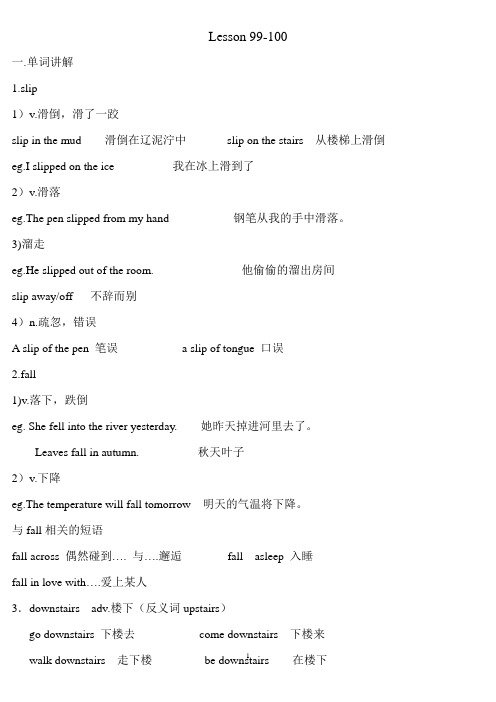
Lesson 99-100一.单词讲解1.slip1)v.滑倒,滑了一跤slip in the mud 滑倒在辽泥泞中slip on the stairs 从楼梯上滑倒eg.I slipped on the ice 我在冰上滑到了2)v.滑落eg.The pen slipped from my hand 钢笔从我的手中滑落。
3)溜走eg.He slipped out of the room. 他偷偷的溜出房间slip away/off 不辞而别4)n.疏忽,错误A slip of the pen 笔误 a slip of tongue 口误2.fall1)v.落下,跌倒eg. She fell into the river yesterday. 她昨天掉进河里去了。
Leaves fall in autumn. 秋天叶子2)v.下降eg.The temperature will fall tomorrow 明天的气温将下降。
与fall相关的短语fall across 偶然碰到…. 与….邂逅fall asleep 入睡fall in love with….爱上某人3.downstairs adv.楼下(反义词upstairs)go downstairs 下楼去come downstairs 下楼来1walk downstairs 走下楼be downstairs 在楼下5.hurt1)v.伤eg.It hurt my back. 它伤了我的背。
2)v. 伤害感情(心灵上或思想上的伤害)eg.I feel hurt . 我感到受了伤害3)v.疼痛eg.Does it hurt? 痛吗6.back1)n.背,背部lie on one’s back 面朝天地躺着/摔倒fall on one’s back 面朝天地躺着eg.I back hurts . 我的背部痛2)n.背面the back of hand 手背3)n.后面,后部eg.There are two students at the back of the classroom. 教室的后面有2名学生4)adv.在后,向后stand back 向后站回原处go back to …回到…. come back to….回来到….put these book back 把书放回原处7.stand up 起立,站起来sit down 坐下stand on one’s head 倒立stand on one’s own feet 独立,不依赖别人,自食其力stand behind 做…后盾,支持…. stand up to….经受住,勇敢面对stand well with 与…和睦相处8.help1)v.帮助2eg.Can I help you?(餐馆:您要吃点什么?商店:您要买点么?)We need your help. 我们需要您的帮助。
新概念课堂笔记 第一册 Lesson 99-100
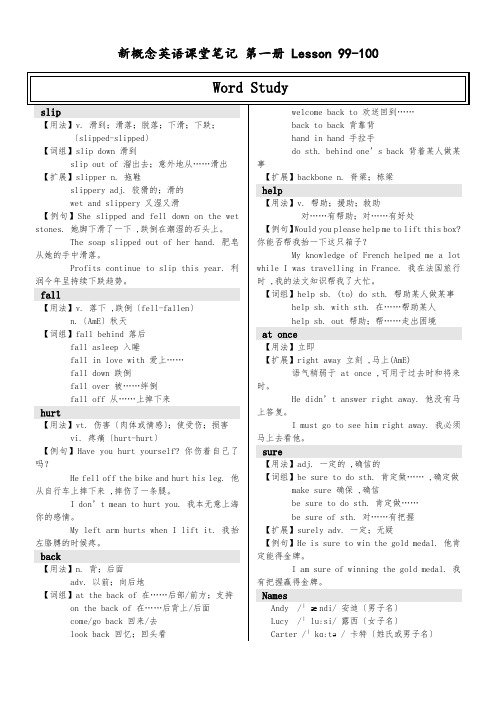
新概念英语课堂笔记第一册 Lesson 99-100【译文】让我来帮你。
【用法】let sb. do sth. 让某人做某事。
I think that the doctor had better see you.【译文】我想最好请医生来给你看一下。
【用法】had better (not) do 最好做〔不做〕……I’ll phone Dr. Carter.【译文】我去给卡特医生打。
【用法】phone sb. = telephone sb. = call sb. (up) = ring sb. up 给……打Dr. 是doctor的缩写 ,意为“医生〞或“博士〞。
【用法】1. 宾语从句的引导词。
○1 that 无意义 ,不充当成分 ,常可省略。
Betty thinks that trees improves the air. 贝蒂认为树可以改善空气。
I hope that it will snow this winter. 我希望今年冬天能下雪。
I believe that we’ll become good friends. 我相信我们会成为好朋友。
○2 whether/if “是否〞 ,不充当成分。
I can’t remember whether/if I have seen him before. 我记不清以前是否见过他。
He asks whether/if we will go fishing on Sunday. 他问周日我们是否会出去钓鱼。
Tom wants to know whether/if he needs to come early tomorrow. 汤姆想知道明天他是否有必要早来。
He doesn’t know whether they will plant trees on Saturday or not. 他不知道他们周六是否会去植树。
注意:if不和or not连用。
○3连接代词:who, whom, what, which, whoseDo you know who is the monitor of Class Two? 你知道谁是2班的班长吗?Can you tell me whom you are going with? 你能告诉我你要和谁一起去吗?I don’t know what the girl’s name is? 我不知道那个女孩叫什么。
新概念英语第一册99-100课课件

• 有人往地上扔了个香蕉皮,我就因为这个 香蕉皮摔倒了。
Lesson 99 Ow!
单词学习
• ow • slip(slipped, slipped) • fall(fell, fallen) 天 • downstairs • hurt(hurt, hurt) • back • stand up • help • at once • sure • X-ray int. 哎呦 v. 滑到,滑了一脚 v. 落下,跌倒; n. 秋 adv. 下楼 v. 伤, 伤害, 疼痛 n. 背 起立,站起来 v. 帮助 立即 adj. 一定的,确信的 n. X光透视
10/29/2013
• back
• • • • • • • • • 1) n. 背,背部 我的背部痛 My back hurts. 2)n. 背面 the back of the hand 手背 3)n. 后面,后部 教室的后面 the back of the classroom.
• • • • • •
• • • • • • •
try doing 试着… 他试着把真相告诉他的妈妈。 He tries telling his mother the truth. Let sb do sth 让某人做某事 放 开他,让他走。 Let him go. I’m sorry, Lucy. I’m afraid that I can’t get up. • 我恐怕会迟到。 • I’m afraid that I will be late. • 恐怕明天会下雨。
新概念英语第一册lesson99-100
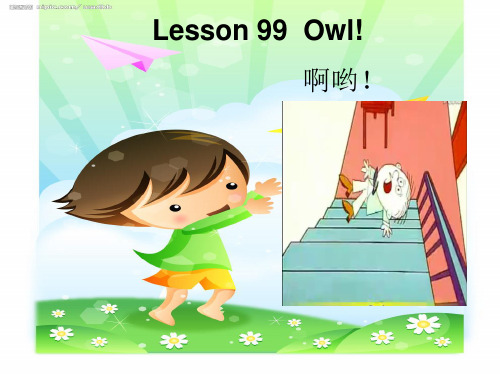
Comprehension:
Ask individual students questions. Students give natural answers 1 T: What did Andy do? S: He slipped and fell downstairs. 2 T: Has Andy hurt himself? S: Yes, he has. 3 T: Does he think he's hurt his back? S:Yes, he does.
Asking questions: Ask me if … 1 T: Andy slipped downstairs. S: Did Andy slip downstairs? T: How ⋯ ? S: How did Andy slip downstairs?
2 T: Ask me if Andy hurt himself. S: Did Andy hurt himself? T . How ⋯ ? S: How did Andy hurt himself?
Let’s have a test.
ቤተ መጻሕፍቲ ባይዱ
C 1. Are you interested in _____? A. how did he do it B. he did it how C. how he did it D. he how did it D 2. I don’t know _____. Can you tell me? A. how the two players are old B. how old are the two players C. the two players are how old D. how old the two players are 3. What did the scientist say? B He said he wondered if _____ into space by spaceship one day. A. he had to fly B. he could fly C. can he fly D. could he fly
新概念第一册lesson99-100(课堂PPT)
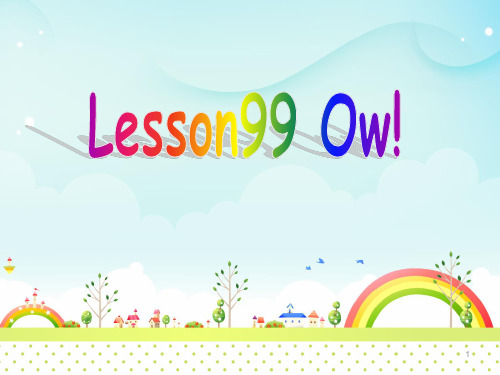
stand up 站立,站起来 sit down 坐下 stand on one’s head 倒立 stand on one’s own feet 独立,自食其力,不依赖别人 stand behind 做…的后盾,支持… 我将一直支持你。 I will stand behind you all the time.
1.whether引导的从句居于句首。
Whether he agrees with me or not,I don’t know.
2.从句位于介词后作介词宾语。 They are talking about whether he will come here.
3.whether在不定式前,与不定式组成词组。
21
使用宾语从句要注意的3个问题:
1.形式宾语it:如宾语从句后有补语,要用形 式宾语it来代替,而将从句放到补语的后面去。
e.g. He has made it clear that the meeting will not be hold.
2. 宾语从句否定意义的转移:在think、believe、 suppose、except等后的宾语中,如从句谓语是 否定的,一般将not移至主句谓语,而将从句宾语变 为肯定形式。即:否定前移。
hurt [hə:t] ( hurt, hurt) v.伤,伤害,疼痛
back [bæ k]
n.背
sure [ʃuə]
adj. 一定的,确信的
X-ray ['eks-rei]
n. X光透视
licence [‘laisəns]
n. 执照
stand 站立 站起来
help 帮助
at once 立刻
2
Listen and Answer
新概念第一册Lesson99-100
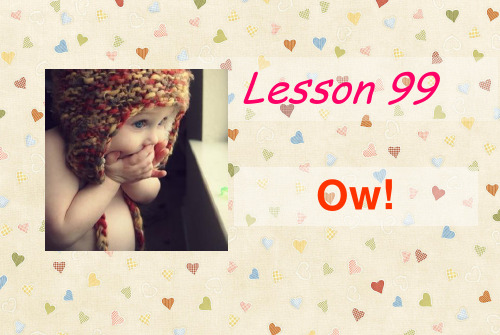
• 宾语从句:
• 宾语可由名词,代词 或名词短语或句子来 充当。当一个句子充 当宾语时,这个句子 称为宾语从句。
1.引导词: • 原句如果是陈述句,变为宾语从句时要用 that引导,而that无意义,仅起连接作用。 在口语和非正式文体中常可省略 that. • I think (that) you can do it.
• 2)n. 帮助 • 希望我能对你有所帮助。 • I hope that I can be any help for you.
★ at once 立刻 • at once : right away; immediately • Everything happened at once. • 所有的事都一起发生了。 • I can make the cat go away at once. • 我能立刻把这只猫弄走。
• 宾语从句表示不肯定或疑问 时,由whether或if引导,表 “是否,是不是,能否”等。 不充当任何句子成,只起连 接作用,但不能省略。 • whether与if引导宾语从句时, 一般可通用,但在下列5种情 况下,whether不可换用if:
• 1.whether引导的从句居于句首。 • Whether he agrees with me or not,I don’t know. • 2.从句位于介词后作介词宾语。 • They are talking about whether he will come here.
★ back [bæ k] n. 背 • 1) n. 背,背面, • I’ve hurt my back. • 我的背受伤了。
2)n. 背面 • the back of the hand • 手背 • 纸的背面 • the back of the paper
新概念英语第1册课程讲义Lesson99-100
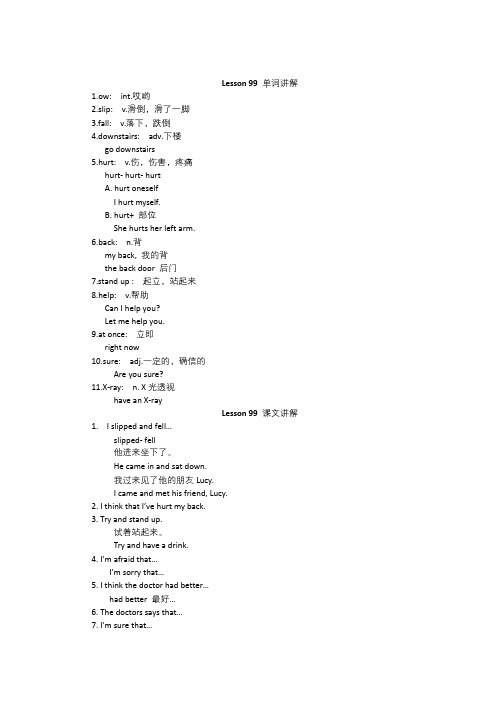
Lesson 99 单词讲解1.ow: int.哎哟2.slip: v.滑倒,滑了一脚3.fall: v.落下,跌倒4.downstairs: adv.下楼go downstairs5.hurt: v.伤,伤害,疼痛hurt- hurt- hurtA. hurt oneselfI hurt myself.B. hurt+ 部位She hurts her left arm.6.back: n.背my back, 我的背the back door 后门7.stand up : 起立,站起来8.help: v.帮助Can I help you?Let me help you.9.at once: 立即right now10.sure: adj.一定的,确信的Are you sure?11.X-ray: n. X 光透视have an X-rayLesson 99 课文讲解1. I slipped and fell…slipped- fell他进来坐下了。
He came in and sat down.我过来见了他的朋友Lucy.I came and met his friend, Lucy.2. I think that I’ve hurt my back.3. Try and stand up.试着站起来。
Try and have a drink.4. I’m afraid that…I’m sorry that…5. I think the doctor had better…had better 最好…6. The doctors says that…7. I’m sure that…Lesson 99 语法讲解宾语从句: 句子作宾语。
I love you.I think (that) he is awful零部件:A. 主句& 从句B. 引导词:thatShe says (that) he loved her.He knows (that) she has gone.He is sorry (that) he will leave.结论1: 主句一般现在, 从句任何时态。
新概念英语第一册Lesson+99-100课件
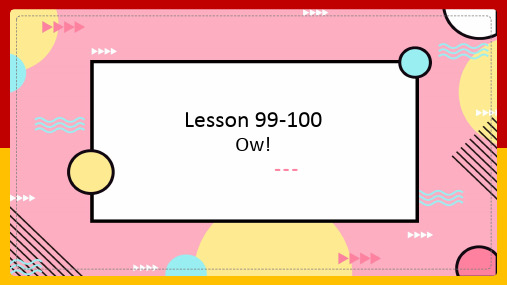
Lily
Lily says that she has got a cold.
What’s the matter with you? I have got a fever.
Mary Mary says that she has got a fever.
What’s the matter with you?
Take an aspirin.
OK.
Lucy
Lucy has got a headache.
Doctor asks Lucy to take an aspirin.
Take some medicine.
OK.
Lily has got a cold. Lily
Doctor asks Lily to take some medicine.
PRACTICE
The boy says “I have got earache.”.
The boy says __h_e__h_a_s__g_o_t_e_a__ra_c_h_e__________.
The children say “ We have got toothache.”.
The children say __th__e_y_h_a__v_e_g_o_t__to_o_t_h_a_c_h_e______.
间接引语 宾语从句
I ask what Lucy has got.
I ask, “What has Lily got?”
I ask what Lily has got.
I ask, “What has Mary got?” I ask what Mary has got.
I ask, “What has Robert got?” I ask what Robert has got.
